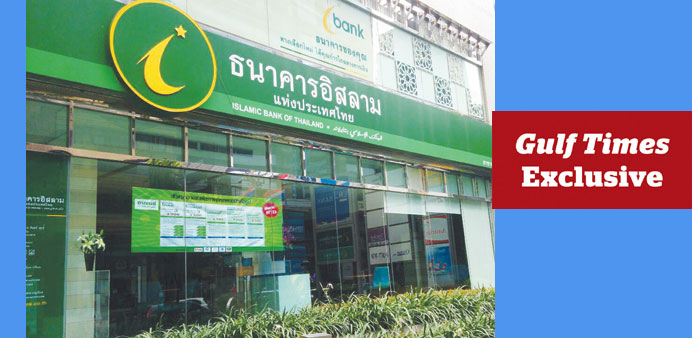A branch of the Islamic Bank of Thailand in downtown Bangkok. At present, IBank tries to restructure $1.7bn of bad loans out of a total loan amount of close to $3bn. Net loss in 2014 was around $300mn. PICTURE: Arno Maierbrugger
By Arno Maierbrugger/Gulf Times Correspondent /Bangkok
Thailand’s sole fully-fledged Shariah-compliant financial institution, state-owned Islamic Bank of Thailand, branded as IBank, has become the target of domestic and foreign investors, including from the Middle East, according to its chairman Chaiwat Uthaiwan.
The bank, which has a troubled history and was close to bankruptcy in 2013 because it struggled to tackle its non-performing loans and had to fend off a bank run by worried customers, has since been in a state of limbo after its president resigned in the same year and with no successor since due to internal conflicts and political meddling.
After Thailand’s current prime minister and junta chief General Prayuth Chan-ocha in June this year remarked that the bank should better “appoint a boss as soon as possible” because it urgently needed to rehabilitate its business, the country’s State Enterprise Policy Office agreed to allow “local or foreign private investors” to acquire more than 50% of stakes in the bank which is – in the case of foreign investors – a rare exception in Thailand’s banking sector.
According to IBank’s chairman, “several Asian financial houses including some from the Middle East” were interested to take over a larger stake. But this could happen only next year because the bank has to separate its good and bad assets first before it could think about a stake sale, he added.
At present, IBank tries to restructure $1.7bn of bad loans out of a total loan amount of close to $3bn. Net loss in 2014 was around $300mn.
The Islamic Bank of Thailand was launched under the Islamic Bank of Thailand Act in 2002 as a state enterprise led by the Ministry of Finance, administered by a board of governors and overseen by a Shariah advisory council. The Act’s provisions say that neither domestic nor foreign investors can open another full-fledged Islamic bank in Thailand, which created a quasi-monopoly for IBank with its only competitors being the small Islamic windows of two other state-owned conventional financial institutions: the Government Savings Bank of Thailand and the Bank for Agriculture and Agricultural Cooperatives.
IBank initially was on an expansion drive and working hard on addressing potential retail customers among the approximately 7mn Muslims in Thailand with Shariah banking services. By the end of 2011, the bank had 101 branches, and planned to add 50 more, and said it wants to expand into Malaysia and Indonesia and even open a branch in Dubai in order to tap the Middle East market including Iran. The bank also once floated the idea of launching the country’s first sukuk.
But most of that didn’t materialise. Retail business was slow despite the bank offering good profit rates, because the Muslim target groups in Thailand’s south were used to organise their money business on their own in partly informal cooperatives. IBank then turned to corporate borrowers and offered Shariah-compliant funding for property and construction firms mainly in Bangkok, a number of which defaulted and left the bank behind with non-performing loans. While all the financing as per Shariah rules involved collateral such as land or property, it turned out that some collateral had been overvalued by IBank – in some cases 80% higher than market prices – and others were even non-existent.
Other obstacles were homemade: Thailand’s financial regulations do not support Islamic banks to engage in trade and investments as double taxation comes into play. There is also a lack of skilled financial engineers who could create sophisticated Shariah-compliant financial services and products for a broader audience, be it Muslim or not. Help of experienced private investors seems to be indispensable in this environment.

